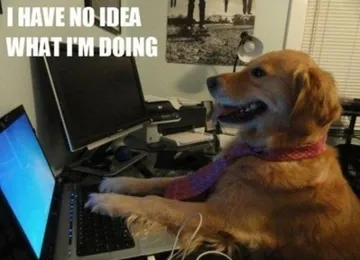You're Good At Your Job

Samara Strauss, Former User Experience Designer
Article Categories:
Posted on
Imposter syndrome doesn't need to be a permanent state of being. Here are 7 tips for moving past it.
As part of my annual performance review last summer, I set one goal that wasn’t directly related to my UX practice: to build confidence at work. This goal flew under the radar — I don’t think we even discussed it in my actual review — but I knew it would be the most important thing I worked on this year.
Like many people, I was suffering from a serious case of imposter syndrome, and I was suffering in silence. I didn’t want to talk about it with anyone because I thought talking about it would make people realize I actually was a huge fraud who was terrible at her job, or they’d think I was latching on to the latest trendy topic as some sort of excuse.

Actual photo of me before building professional confidence.
Here’s the thing about imposter syndrome: it seems like another trendy topic until you’re the one suffering from it. Then, you you know how all-consuming the fear and anxiety can be. Fortunately, imposter syndrome doesn’t have to be a permanent state, something I wish I’d realized sooner.
In the last year, I’ve made good on my goal. I feel — no, I know — that I am a talented and accomplished UX designer, but getting here took a lot of work. If you’ve ever felt like I have, I want you to know you’re not alone. You are good at your job, and there are things you can do to help internalize this belief. Below are some tactics that worked for me, and I hope will work for you, too.
Define (or re-define) “Good”
You can’t really assess whether you’re good at your job until “good” is defined. Here are a few things to remember:
“Good” is always changing. It is not an end point. It is relative to where you are right now. If you’re in the first year of your first job, “good” will be defined differently than it will be five years into your career.
“Good” is personal. It is not the industry all-star or that coworker that seems to pick up everything naturally. “Good” is about you and your performance at a given point in your career.
“Good” is not about being perfect. You can still be good at your job and have many areas in which you’d like to improve.

Recognize your strengths
Often times, we completely forget there are things we’re good at when we become self-critical, but taking time to recognize your strengths is just as important as recognizing areas in which you need to improve. Without recognizing what we’re good at, professional development becomes an exhausting and unsustainable game of moving the line. Give yourself a pat on the back when credit is due, and don’t be fooled by the false narrative that self praise will lead to complacency.
Recognize positive feedback and successes
Don’t let negative feedback have all the attention. When someone gives you positive feedback, write it down.
Also, note successes, both big and small. When a project goes well, recognize how you contributed. When you learn something new, congratulate yourself on making that progress.
Write everything down
Writing will help you remember. Your memory is selective and inaccurate, and if you’re primed to think you’re bad at your job, you’re more likely to remember when things go wrong than when they go right. Writing down positive feedback and successes may help you to remember things more positively.
Writing can also help you process and reflect more objectively. If you had a bad day, writing about it may help you more accurately see where you contributed to any perceived failures and where factors outside of your control may be at play. It may also help you realize something you thought was a big deal actually isn’t.

Require specificity
Require specificity from both yourself and your peers when it comes to constructive criticism. Otherwise, letting yourself and others make sweeping, overly general, and critical statements about your work performance might feed the incorrect narrative that you’re bad at your job. When criticism is specific, it becomes actionable. It becomes about a skill, not about you as a person or professional. It becomes a potential future victory, something that you’ll eventually get to add to the laundry list of the many reasons why you’re good at your job.
Establish an inner circle
If you’re an introvert, you may be OK building professional confidence on your own. If you’re an extrovert like me, it helps to have a small inner circle.
Build inner circles around people who have a grasp on what you do professionally, though they don’t need to be coworkers. They can be industry peers, friends, or even family — just as long as it’s someone who knows enough about what you do to give you an informed perspective. They should be supportive but honest, not overly inclined to either praise or criticism.
Inner circles are good for celebrating victories, support, and perspective. On bad days, they’ll remind you of your victories, keep you from getting too negative, and provide encouragement. They’re an objective and supportive ear for when you need to get out of your own head.
But be careful — inner circles are not compliment factories, and they’re not there to feed your ego. Your inner circle is part of a larger toolkit, so treat them with respect and don’t make them do all the work.
Talk about your work
Talking about your work makes you realize how much of an expert you are. Explain your work. Answer questions about it. When you realize you’re not only holding your own in a conversation but you’re also teaching someone else something, you’ll realize that you’re a lot better at your job than you’ve been giving yourself credit for.
----
Building confidence and moving past imposter syndrome is just as important as building your “technical” skills. You’re worth it, and it’s worth putting in the time to show yourself that you’re already good at your job.
